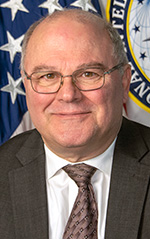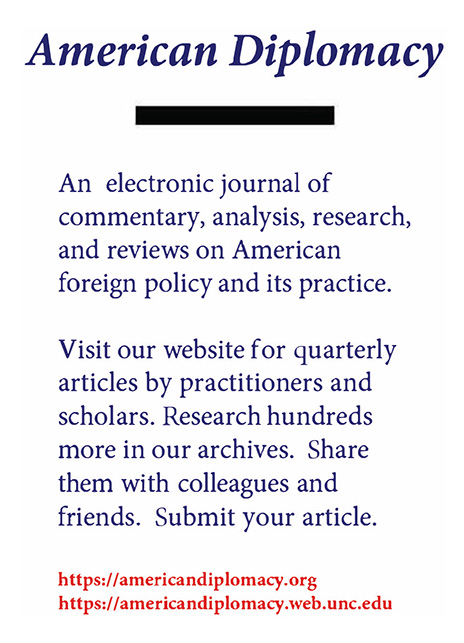Effective Public Diplomacy During NATO Enlargement
Reflections
BY GORDON DUGUID
NATO’s enlargement is one of the many public excuses the Kremlin made for its full-scale invasion of Ukraine. The premise is that NATO took advantage of the collapse of the Soviet Union by absorbing former Warsaw Pact countries to threaten and intimidate Moscow. This argument seems to have some tactical merit, but only in hindsight: It does not align with what NATO officials and strategists were planning in 1992.
As the information officer at the U.S. mission to NATO from 1996 to 2000, I witnessed the “first” NATO enlargement, when Poland, Hungary, and the Czech Republic joined the Alliance. I conducted the NATO Tour program through which our mission supported U.S. and NATO policy by educating target audiences from Russia and former Warsaw Pact countries about NATO and its mission.
What NATO Allies were actually working on during my time at NATO was conditioning the entry of new countries to the Alliance until they could meet all political, economic, and military requirements. Under U.S. leadership, the Allies created the Partnership for Peace Program (PfP) in 1994 to “enable participants to develop an individual relationship with NATO, choosing their own priorities for cooperation, and the level and pace of progress.” In other words, NATO’s policy was to slow things down, rather than expand too hastily.
From my engagement with Russian officials, I know any claim by the Kremlin that they believed NATO’s policy of welcoming new members was directed at Russia is spurious. I was in the hallways at NATO headquarters when the first Russian generals were escorted in for military briefings. We were also transparent with Moscow’s political establishment.
In January 1997, in advance of the creation of the NATO-Russia Council, USNATO hosted four Russian senators (Federation Council members), explaining NATO’s “Open Door” policy to the group.
NATO has never sought out new members, but any democracy in the trans-Atlantic region can request admittance to the Alliance. We reminded the Russian senators that NATO had expanded before: in 1952 when Turkey and Greece joined; in 1955 when West Germany joined; in 1982 when Spain was admitted; and in 1990 when East Germany joined NATO during German unification. None of those enlargements led to any significant change in NATO’s defensive position or, conversely, in Russia’s view of Europe.
Putin’s much-quoted offer to Lord Robinson that Russia join NATO is mythical or, at best, ironic, because the post–Cold War order Putin openly desired was that there be no alliances in Europe, only a peace guaranteed by America and Russia over respective spheres of influence.
During our briefing, the Russian senators learned that NATO policy permitted European countries to join PfP to be able to cooperate with NATO without becoming members. Most former Warsaw Pact nations had much work to do on their political structures, let alone their military organization, before they would be ready and eligible for NATO membership.
Putin’s much-quoted offer to Lord Robinson that Russia join NATO is mythical or, at best, ironic.
Even after two days of briefings, the senators could scarcely believe that each NATO member had an equal voice, even though none could match individually the strength of American arms. For them, the Warsaw Pact was run by Russia for Russia. They presumed it was the same with NATO.
I cannot vouch that the senators were convinced of political equality within NATO, but they did not seem to worry about NATO enlargement. As one said to me on their departure: “I hope you take in all the countries from the Warsaw Pact. They’ll kill your organization just like they did ours. They are nothing but trouble.” His prediction has proven wrong—there is zero equivalence between the ethos of NATO and the Warsaw Pact.
The Kremlin knew that NATO would expand because most countries of Central and Eastern Europe were telling everyone, quite openly, that they wanted to join NATO and the European Union (EU).
In October 1997, USNATO invited senior officials from the most promising NATO candidates—Poland, Hungary, and the Czech Republic—on a NATO Tour of Houston, San Antonio, Chicago, and Washington, D.C.
Our goal was that senior officials instrumental in forming NATO policy for candidate countries become well versed with U.S. policy, policymakers, and the political and social conditions in which U.S. policy is made.
The trip was also valuable in exposing our guests to U.S. public opinion. For example, they took part in a two-hour talk radio show on Houston’s KENR. Listeners wanted to know why our guests’ countries wanted to join NATO and what they could bring to the Alliance. Our guests were surprised to learn that some Americans were skeptical of NATO and its role, so this discussion helped them to address the concerns of skeptics at home.
The highlight of the Houston stop was a Baker Institution seminar at which our visitors heard addresses by George H.W. Bush, James Baker, Warren Christopher, Henry Kissinger, and Mikhail Gorbachev. I was able to introduce them to Kissinger, and they sought his advice on which reforms their countries should focus on first.
Next, the World Affairs Council of San Antonio arranged a reception with the mayor and his international affairs councilman to discuss how businesses could benefit from Alliance membership. We finished off with a visit to the Defense Language Institute at Lackland Air Force Base to discuss military training for NATO.
They pointedly noted that such a conversation with an opponent of government policy was something that would have never happened in the Warsaw Pact.
In Chicago, we met with members of the Council on Global Affairs for further serious discussions on foreign policy. Our itinerary included cultural events—a tour of Chicago’s architecture, a visit to the Chagall mural and Picasso’s sculpture, a stroll along Michigan Avenue, and a raucous dinner at Buca di Beppo’s.
Our guests cited these events as just as valuable as the policy briefings. They liked seeing how ordinary Americans lived and thought about global issues. They were touched that I included them in an evening with my family and friends.
In Washington, D.C., we met with Susan Eisenhower, the highest-profile American opponent of NATO enlargement; participants said it was the best debate they had on the issue.
Our guests explained to Eisenhower that they wanted to be fully in the West because they worried about Russian revanchism but also because they saw the success of the EU and NATO as proof of the validity of the West’s fundamental values. They pointedly noted that such a conversation with an opponent of government policy was something that would have never happened in the Warsaw Pact.
The Poles cited NATO’s founding document, saying that to deny membership to any country that met NATO standards would betray the Open Door principle. After 45 years of Russian domination, they were ready to be equals in democratic structures.
That feeling was still strong in 2018, when I was serving as chargé in Montenegro. Montenegro joined NATO in 2017, realizing fully that they would be sending their troops to defend U.S. and Alliance interests in Iraq and Afghanistan the day after they got in.
NATO did not enlarge as a policy to thwart Russia. Rather, countries in Central and Eastern Europe flock to NATO and the EU as soon as they can because of their experiences under Russian domination and the promise to be equal partners in democratic organizations.
This is what the Kremlin still fails to understand.
When sharing or linking to FSJ articles online, which we welcome and encourage, please be sure to cite the magazine (The Foreign Service Journal) and the month and year of publication. Please check the permissions page for further details.




